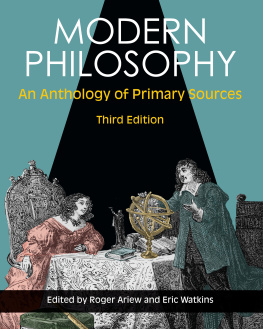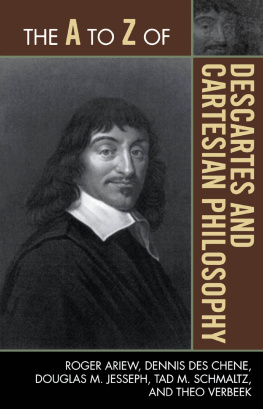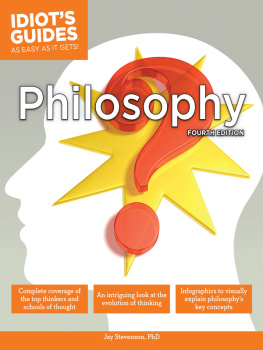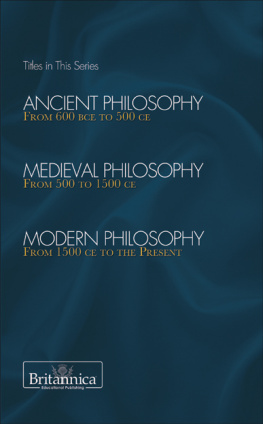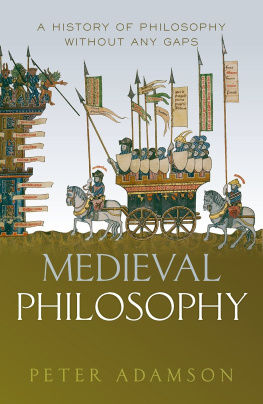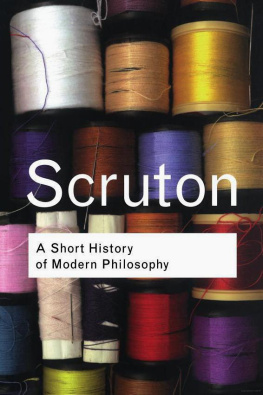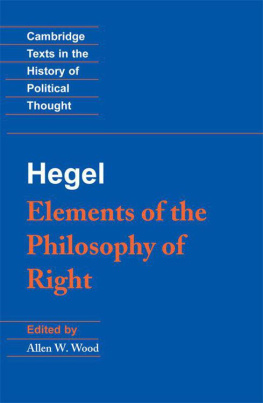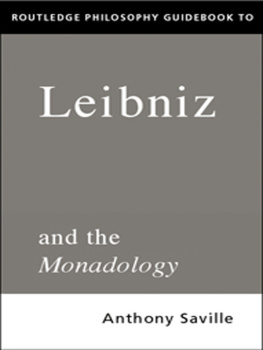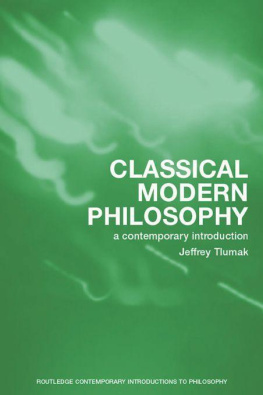Contents
Guide
Modern Philosophy
An Anthology of Primary Sources
Third Edition
Modern Philosophy
An Anthology of Primary Sources
Third Edition
Edited by
Roger Ariew
and
Eric Watkins
Hackett Publishing Company, Inc.
Indianapolis/Cambridge
For David, Daniel, Christa, and Nicholas, who we hope found this anthology of use.
Copyright 2019 by Hackett Publishing Company, Inc.
All rights reserved
Printed in the United States of America
22 21 20 19 1 2 3 4 5 6 7
For further information, please address
Hackett Publishing Company, Inc.
P.O. Box 44937
Indianapolis, Indiana 46244-0937
www.hackettpublishing.com
Cover design by E.L. Wilson
Interior design by Dan Kirklin
Cataloging-in-Publication data can be accessed via the Library of Congress Online Catalog.
ePub3 ISBN: 978-1-62466-845-6
Margaret Cavendish, Observations upon Experimental Philosophy, Abridged. Edited, with an Introduction, by Eugene Marshall.
Classics of Western Philosophy, Eighth Edition. Edited by Steven M. Cahn.
Philosophical Inquiry: Classic and Contemporary Readings. Edited, with Introductions, by Jonathan E. Adler and Catherine Z. Elgin.
Woman Philosophers of the Early Modern Period. Edited, with Introduction, by Margaret Atherton.
For more titles in Hacketts Modern Philosophy catalog, visit https://www.hackettpublishing.com/philosophy/modern-philosophy
{vii}
When G. W. Leibniz traveled to Paris in 1672, he found an intellectual environment in great turmoil. Leibniz was trained in Aristotelian (or scholastic) philosophy, which had dominated European thought ever since the thirteenth century when the majority of the Aristotelian corpus was rediscovered and translated from Greek and Arabic into Latin and then made compatible with Christian doctrine (by Thomas Aquinas and others). Until his trip to Paris, Leibnizs properly philosophical works consisted primarily of a thesis on the scholastic problem of the principle of individuation and the publication of a new edition of an obscure 16th-century philosopher who had attempted to rehabilitate a more authentic Aristotelian philosophy from the barbarism of the scholastics. But a philosophical revolution was taking place in mid-17th-century Paris. New scientific and philosophical doctrines had emerged from Galileo Galilei, from Ren Descartes and his followers, from Francis Bacon, Blaise Pascal, Thomas Hobbes, and countless others. Scholastics had fought back fiercely against the new philosophy and science; they had succeeded in getting Galileo condemned by the Catholic Church in 1633 and in putting Descartes works on the Index of Prohibited Books in 1663. Still, the substantial forms and primary matter of the scholastics were giving way to a new mechanistic world of geometrical bodies, corpuscles, or atoms in motion. With this world came novel mathematical tools and scientific methods for dealing with its newly conceived entities. Old problems that seemed to have been resolved within a scholastic framework were raised again with new urgency: what can one say about necessity, contingency, and freedom in a world of atoms governed by laws of motion? The structure of the universe, whether it is finite or infinite, as well as the concepts of space and time, were up for grabs. Other basic philosophical issues were also keenly debated, including the location of the soul, its immortality, Gods purpose in the creation, and his relation to the universe. With such a great intellectual upheaval came the questioning of whether humans even have knowledge at all. Leibniz, of course, became a major contributor to this intellectual movement that defined the modern world. In Paris, he read and copied Descartes manuscripts and sought out proponents of the new philosophy, such as Antoine Arnauld and Nicholas Malebranche; his own later work was often precipitated by the correspondence he maintained with them and others such as Pierre Bayle. He traveled to London and met members of the Royal Society (Henry Oldenberg and Robert Boyle, among others, though not Isaac Newton, with whom he later corresponded). On his way back to Lower Saxony, he visited Baruch Spinoza in the Netherlands. Of course Leibniz did not have the opportunity to interact with David Hume and Immanuel Kant; Hume was born just four years prior to Leibnizs death and Kant almost a decade after that. {viii} Yet Leibniz would have been quite interested in both of these figures acute, albeit radically divergent reflections on these philosophical developments. For Humes empiricist approach led to a certain kind of skepticism, while Kants criticism of pure reason did not obviate completely the possibility of substantive knowledge of the world.
Historians of philosophy often draw a broad picture of modern European philosophy, depicting two distinct camps: rationalists (Descartes, Spinoza, and Leibniz) who emphasize reason at the expense of the senses, and empiricists (John Locke, George Berkeley, and Hume) who emphasize the senses after rejecting innate ideas. This rudimentary picture is often filled out as follows. After calling into doubt seemingly all beliefs (especially those based on the senses), Descartes, the father of modern philosophy, attempts to ground all of our knowledge on innate ideas he discovers and rationally reflects on within himself, beginning with the idea he has of himself as a thinking thing (in the cogito). Accordingly, reason, by coming to a clear and distinct conception of its own ideas, attempts to establish knowledge about the world with the same kind of absolute certainty, precision, and necessity attainable in mathematics. While Spinoza and Leibniz revise and even reject some of Descartes fundamental principles, they both accept Descartes rationalist approach of rejecting sensory ideas as inadequate or confused in favor of innate ideas, which alone can be adequate or clear and distinct to reason. In this way, it is often claimed, Spinoza and Leibniz carry Descartes rationalist philosophy to its ultimate, logical conclusion.
Locke, by contrast, breaks with the rationalists approach by rejecting innate ideas and by claiming instead that the content of all of our mental states or ideas must stem from experience, whether it be from sensation or reflectiona claim that more or less defines empiricism in this context. Locke rejects innate ideas, not only because he cannot find any ideas that enjoy universal assent, but also because he thinks that philosophers often talk about ideas without understanding clearly what meaning they havean error encouraged by accepting innate ideas, since believing that an idea is innate precludes one from determining its true origin and thus its precise meaning. Since Locke rejects innate ideas, he views the proper task of philosophy as one of analyzing the precise meaning of the ideas we get from sensation and reflection and determining what we can come to know about the world purely on the basis of these ideas. Just as Spinoza and Leibniz follow Descartes rationalist assumptions to their logical conclusions, so too, it is often claimed, Berkeley and especially Hume correct the inconsistencies in Lockes position, thus drawing out the proper consequences of Lockes empiricist approach. (Often Kant is presented as the culminating figure of modern philosophy with his attempt at synthesizing the rationalist and empiricist traditions, though Kant, too, was in turn successively corrected by German Idealists, such as Fichte, Schelling, and Hegel.)

